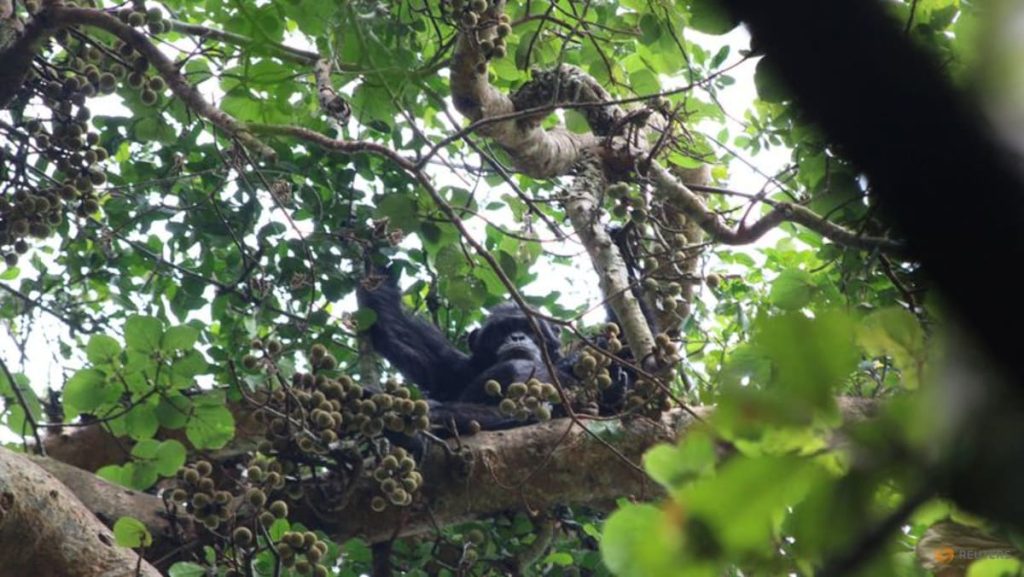WASHINGTON :Ripe fruit is an integral part of the diet of wild chimpanzees, as they routinely eat an amount equaling about 10 per cent of their body weight daily. And because this fruit often is undergoing natural fermentation, they are ingesting a surprising quantity of alcohol – the equivalent, according to scientists, of a person drinking two cocktails per day.
Researchers studied chimpanzees at two sites – one in Uganda in East Africa and another in Ivory Coast in West Africa – and measured the alcohol content of the fermented ripe fruits they consume regularly. The scientists then calculated that the chimps, based on their usual food intake, may ingest every day 14 grams of ethanol, the principal type of alcohol found in alcoholic beverages.
So the obvious question is whether there are hordes of drunken chimps tottering across the African landscape. The answer, the researchers said, is no. The chimps exhibited no obvious signs of intoxication, they said, noting that the consumption of the fermented fruit was spread over many hours during foraging, thereby limiting the alcohol’s impact.
“It’s difficult to say how much consuming this amount of dietary alcohol would affect the behavior of chimpanzees,” said Aleksey Maro, a doctoral student in the Department of Integrative Biology at the University of California, Berkeley, and lead author of the study published on Wednesday in the journal Science Advances.
“We know that just the presence of a lot of ripe fruit can affect things like how often they go on territorial patrols and hunts. And the estrous cycle of female chimpanzees, when they are fertile, is timed around when large amounts of food are available. It’s possible ethanol could play a role in some of these diet-related dynamics, especially when they’re able to consume large volumes of fruit quickly,” Maro said.
Chimpanzees are specialists in consuming ripe fruits, which represent more than 70 per cent of their diet.
“Their lives basically revolve around what’s in season or what happens to be randomly fruiting,” Maro said.
The researchers sampled a total of 21 fruit species at the two study sites – Uganda’s Kibale National Park and Ivory Coast’s Tai National Park.
“The number and diversity of fruit species in the chimpanzee diet is staggering, ranging from bowling ball-sized fruits to fruits that are composed almost entirely of seeds with just a little pulp glued to them – and everything in between. So, at each site we sought out the fruit species that those chimpanzees spent the most time consuming on an annual basis,” Maro said.
Figs were a vital food source for the chimpanzees observed in Uganda, encompassing a quarter of their annual feeding time. The Ivory Coast chimpanzees spent the most annual time consuming a plum-like fruit with bright green flesh.
“We think the alcohol within the fruit pulp is produced as a fermentation product by yeasts, and possibly other microbes, that are able to live and reproduce within the fruit without outward signs of decay. The yeasts consume the sugar in the fruit, but instead of digesting it all the way they store it as ethanol,” Maro said.
It was unclear whether chimps actively seek fruit with higher alcohol content – riper fruit with more sugars to ferment.
“It’s certainly plausible,” Maro said. “We hypothesize that they judge whether to eat a fruit in their hand partly based on the smell of ethanol.”
In the United States, the standard alcoholic drink contains about 14 grams of ethanol. In many other countries, the amount is 10 grams. Adjusting for body mass – a typical chimpanzee’s weight is just over half that of a typical human – that would mean the daily consumption for chimps calculated in the study would be the equivalent of a person having roughly two standard drinks daily.
The findings may lend support to an idea, called the “drunken monkey” hypothesis, proposed by UC Berkeley professor of integrative biology Robert Dudley that the human appetite for alcohol was inherited from our evolutionary ancestors.
Chimpanzees, along with their cousins the bonobos, are the closest genetic relatives to people. The evolutionary lineage that led to humans split from the one that led to chimpanzees roughly 6 million to 8 million years ago.
Dudley, senior author of the new study, said the findings establish the evolutionary background for likely exposure to ethanol in the most recent common ancestor of chimps and humans.
“Ingestion of alcohol would thus be advantageous for caloric gain and ultimately survival,” Dudley said. “The underlying attraction mechanisms may have been retained in modern humans, rendering our tendencies to consume liquid alcohol – sometimes to excess – an ‘evolutionary hangover.'”


